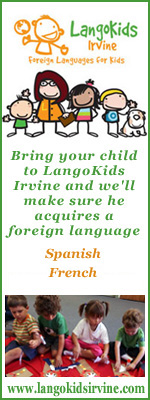|
Why,
How, and When Should My Child Learn a Second
Language?
By: Kathleen Marcos of the
ERIC Clearinghouse on Languages and Linguistics.
Brought to you by Lango-Foreign
Languages for Kids.
Much
media attention has recently been focused on
the importance of early learning experiences
on brain development. Newsweek devoted a special
edition to the critical first 3 years of a child's
life and indicated that there is a "window of
opportunity" for second language learning starting
at 1 year of age. A February 1997 article in
Time magazine suggested that foreign languages
should be taught to children as early as possible.
With so many demands already placed on children,
parents might ask: Is it important that my child
learns a second language at a young age? Why?
What
Are the Benefits of Knowing a Second Language?
In
addition to developing a lifelong ability to
communicate with more people, children may derive
other benefits from early language instruction,
including improved overall school performance
and superior problem-solving skills. Knowing
a second language ultimately provides a competitive
advantage in the workforce by opening up additional
job opportunities. Students of foreign languages
score statistically higher on standardized tests
conducted in English. In its 1992 report, College
Bound Seniors: The 1992 Profile of SAT and Achievement
Test Takers, the College Entrance Examination
Board reported that students who averaged 4
or more years of foreign language study scored
higher on the verbal section of the Scholastic
Aptitude Test (SAT) than those who had studied
4 or more years in any other subject area. In
addition, the average mathematics score for
individuals who had taken 4 or more years of
foreign language study was identical to the
average score of those who had studied 4 years
of mathematics. These findings are consistent
with College Board profiles for previous years.
Students of foreign languages have access to
a greater number of career possibilities and
develop a deeper understanding of their own
and other cultures. Some evidence also suggests
that children who receive second language instruction
are more creative and better at solving complex
problems. The benefits to society are many.
Americans fluent in other languages enhance
our economic competitiveness abroad, improve
global communication, and maintain our political
and security interests.
Why
Is It Better for My Child To Learn a Language
Before Middle School?
Studies
have shown -- and experience has supported --
that children who learn a language before the
onset of adolescence are much more likely to
have native-like pronunciation. A number of
experts attribute this proficiency to physiological
changes that occur in the maturing brain as
a child enters puberty. Of course, as with any
subject, the more years a child can devote to
learning a language, the more competent he or
she will become. Regardless, introducing children
to alternative ways of expressing themselves
and to different cultures generally broadens
their outlook and gives them the opportunity
to communicate with many more people.
Will
a Second Language Interfere With My Child's
English Ability?
In
most cases, learning another language enhances
a child's English ability. Children can learn
much about English by learning the structure
of other languages. Common vocabulary also helps
children learn the meaning of new words in English.
Experimental studies have shown that no long-term
delay in native English language development
occurs in children participating in second language
classes, even in full immersion programs. When
children start learning languages at birth,
they have the capacity to learn many languages
at once without getting confused? because, as
the brain develops, so too does the ability
to separate one language from another.
In
fact, children enrolled in foreign language
programs score statistically higher on standardized
tests conducted in English. A number of reports
have demonstrated that children who have learned
a second language earn higher SAT scores, particularly
on the verbal section of the test. One study
showed that by the fifth year of an immersion
program, students outperformed all comparison
groups and remained high academic achievers
throughout their schooling.
If
My Child Is Enrolled in a Language Program,
What Can I Do To Help?
Most
importantly, encourage your child's interest
in the language and in other cultures. Show
him or her that you value the ability to speak
a second language. Attend cultural events that
feature music, dance, or food from the country
or countries where the language is spoken. If
possible, provide some books, videos, or other
materials in the second language. If you are
familiar with the language yourself, read to
your child.
This
article is brought to you by: Lango-Foreign
Languages for Kids. At Lango we believe every
American child can and should learn a second
language. Headquartered in San Francisco, California,
Lango teaches children ages 1-12 new languages
in full immersion classes through culturally
based music, art, games, stories and movement.
Camps are available full or half time in the
summer, spring and winter. Dates, time, duration
and age range may vary, depending on location.
Contact
us today for a free trial class!
|



![]()
